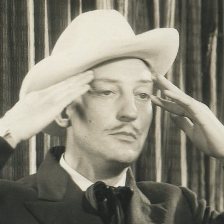In the previous post I’d mentioned that towards the tail end of World War I Warren William “found himself in the army as a sergeant in the Minnesota division. But, once the armistice was signed, he found himself applying for a chance to tour the army camps with Madison Corey’s theatrical troupe.”
Immediately after posting that I wanted to see if I could find out anything about Corey’s army tour. While I couldn’t find a direct reference to Warren William’s involvement, and of course, “applying for a chance to tour” doesn’t indicate whether he was accepted or not, I did find a 1920 publication copyrighted to the “International Committee of Young Men’s Christian Associations” titled “History of the Y. M. C. A. in the Le Mans area,” that does shed some light on the tour itself.
Since the title falls in the public domain I’m going to quote it extensively in this post.
Here’s the where and the why:
After the signing of the armistice, G.H.Q., A.E.F. searched for a center where, during the process of demobilization, the American Army could be sent to complete final arrangements for sailing for America. From a geographical standpoint no more central place could be found, because Le Mans is almost equally distant from the embarkation points, Bordeaux, Brest, St. Nazaire and Le Havre with direct railway communication to each. Therefore, it was chosen as the center for embarkation troops
Up until this time the Le Mans area was a part of the S.O.S. but on December 15, 1918 it was taken from that branch and made a separate unit known as the American Embarkation Center or the A.E.C.
What’s the Y.M.C.A. got to do with this:
The history of “Entertainment” for the American soldier by the Y.M.C.A. must necessarily be a combined report of Y.M.C.A. and Army service, due to the fact that the A.E.F. Show World was so closely combined in the two factors serving.
Corey’s involvement:
Y.M.C.A. Headquarters at Paris realized that the Le Mans Region was the largest in the A.E.F., and that here there must be a concentration of effort. On January 15 Madison Corey, a New York City theatre manager, arrived at Entertainment House to manage the program for the Y.M.C.A. Appreciating not only the heavy responsibilities but the great possibilities which entertainment held in the life of the soldier, Mr. Corey immediately laid the foundation for what S.O.S. Headquarters of the American Army at Tours reported as being the largest producing machine of the A.E.F. A report for the month of January stated four YMCA playing troupes and about a half dozen Army shows. These, with transient groups of players from the various home going divisions played about six hundred shows during the month to a total audience not exceeding a hundred thousand men. The value of the words, amazing growth in the A.E.C. Show World, may be appreciated when the figures mentioned for the month of January are compared with those for the month of April, when there were 4,250 performances given to a combined audience of more than 3,500,000, and in May when there were 3914 performances to an attendance of over 2,800,000.
Of course, this remarkable feat was attended with many interesting tales of trouping the gasoline circuit by the fliver route. Theatres were scarce and shows were played in huts, tents, on trucks, in the open on tables and possibly even in the loft of some French barn or stable. What professional actor or actress ever thought as they leaned over the glistening footlights of a metropolitan theatre, to an audience robed in tulle and lace, that their’s was to be the privilege of trouping France in rain and mud, mimicking and making merry for the victorious soldiers of our country!
Entertainment House was not, however, just a clearing house or booking agency for traveling shows of the Y.M.C.A. and Army. It became known as the largest “Play Factory” in the A.E.F.
Entertainment House is, of course, the recognized name which covers the home of the “Y” and Army Theatre. Both the Y.M.C.A. and Army had its well organized details in charge. Madison Corey acted as Director for the Y.M.C.A., and Lieutenant C.C. Young, Entertainment Officer for the Army. There was a perfect coordination of forces and to say the least Entertainment House formed a model combination of an up to date “Play Factory” and booking office.
Without question entertainment was one of the most valuable forces in the life of the soldier after the signing of the Armistice. The A.E.F. Theatre has been commended as being the greatest builder of morale available.


I am in the middle of transcribing my grandfather’s notes on his time in France during WWI. I just a portion of his notes where describes Mr. Corey throughout the Le Mans regions to various entertainment sites. If you would like to see what I have, please let me know.
Nothing on Warren William, though.
Hi Barbara, thank you so much for your offer, but I think I’m going to pass. Of course, if anything does come up on Warren William I’d be extremely interested, but I think putting this post together I learned what I needed to know about Corey.
Must be a fascinating project, hope you find some good stuff! Thanks again —
Cliff